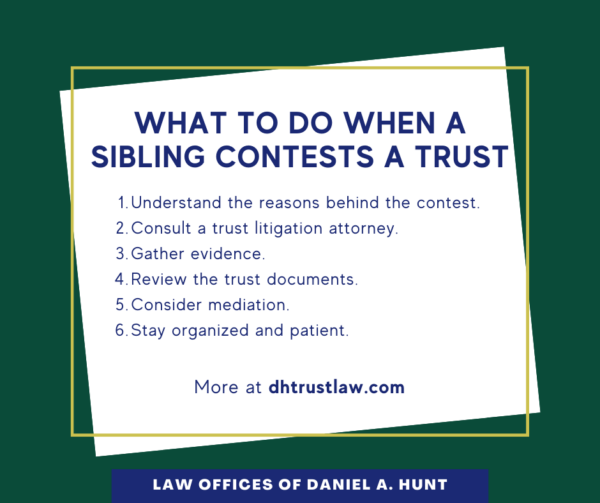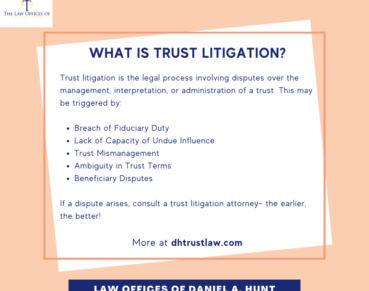What to Do When a Sibling Contests a Trust

A successor trustee’s job can become much harder when a sibling decides to contest the trust. These disputes can be emotionally charged, financially draining, and legally complex. If you’re wondering what to do when a sibling contests a trust, here is an overview of how to navigate this challenging situation.
Understand the Reasons for the Contest
When a family member contests a trust, begin by understanding the motivations behind their actions. Siblings may contest a trust in hopes of receiving a larger inheritance. Often there are complex family dynamics behind legal conflicts between family members. Understanding the specific reason behind the trust contest is crucial as it will shape your response and legal strategy.
Sometimes there is a legitimate reason to contest a trust. Common reasons siblings have successfully contested a trust include:
- Undue influence: Claiming that one sibling manipulated or coerced the person who created the trust into making specific decisions regarding the trust.
- Lack of capacity: Allegations that the settlor was not of sound mind or lacked the mental capacity to make rational decisions when creating the trust.
- Fraud or forgery: Accusations that the trust documents were created through deceitful or fraudulent means.
- Ambiguity in trust language: Disputes arising from unclear or ambiguous terms in the trust document.
- Unequal treatment: Claims that the trust’s distribution of assets is unfair or that one sibling was favored over others.
Consult a Trust Litigation Attorney
When faced with a trust beneficiary contesting a trust in California, it is vital to consult with an experienced trust litigation attorney who specializes in trust disputes and understands the California Probate Code.
An attorney can help you understand the legal implications, your rights, and the available options. They will guide you through the legal process, represent your interests, and ensure that you comply with all applicable laws and regulations.
Gather Evidence
In preparation for a potential legal battle, it’s crucial to gather all relevant evidence to support your case. This may include:
- Financial records
- Medical assessments
- Communication records
- Witness statements
Be sure to work closely with your attorney to ensure you have a strong case.
Review the Trust Documents
Thoroughly review the trust and any related estate planning documents. Ensure that you fully understand the terms and conditions of the trust and its intended purpose. Your attorney can help you interpret the legal documents and identify any clauses that may be subject to dispute.
Consider Mediation
Some family disputes can be resolved through mediation, a form of alternative dispute resolution that can sometimes help avoid a lengthy and costly probate court battle. Mediation is an informal arrangement in which a neutral third party acts as a mediator between the conflicting parties.
Each party attends a scheduled mediation with their attorney (if they have retained one) and presents their side. The mediator offers suggestions to help resolve the dispute. Mediators are not supposed to give legal advice. They do not issue orders, find fault, or make determinations. Instead, they serve as a guide for the negotiations.
If you are open to preserving family relationships and negotiating, consider using mediation as a neutral forum for addressing concerns and potentially reaching a compromise before it becomes a full-blown contested court matter.
Stay Organized and Patient
Trust disputes can be prolonged and emotionally draining. It’s essential to stay organized and patient throughout the process. Keep records of all communications and legal proceedings, and maintain open lines of communication with your attorney. Consider seeking emotional support from friends, family, or a therapist to help you cope with the stress and strain of the situation.
Contesting a trust within a family can be a difficult and emotionally charged experience. It’s important to approach the situation with empathy, understanding, and a willingness to explore potential resolutions. Consulting with an attorney, understanding the motivations behind the contest, and staying organized are key steps to navigating this complex issue. Ultimately, the goal should be to respect the settlor’s intentions and minimize harm to family relationships.
If you have any questions about what to do when a sibling contests a trust, feel free to contact our law firm.
Law Offices of Daniel A. Hunt
The Law Offices of Daniel A. Hunt is a California law firm specializing in Estate Planning; Trust Administration & Litigation; Probate; and Conservatorships. We've helped over 10,000 clients find peace of mind. We serve clients throughout the greater Sacramento region and the state of California.




